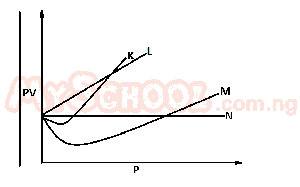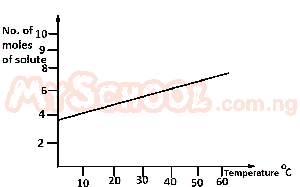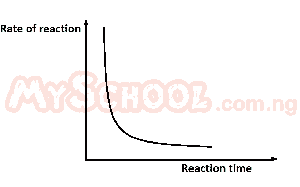Chemistry 2011 JAMB Past Questions
Chemistry 2011 JAMB Past Questions
1. What is the concentration of a solution containing 2g of NaOH in 100cm3 of solution?
[Na = 23, O = 16, H = 1]
- A. 0.40 mol dm-3
- B. 0.50 mol dm-3
- C. 0.05 mol dm-3
- D. 0.30 mol dm-3
Correct Answer: Option B
2. Which of the following properties is NOT peculiar to matter?
- A. kinetic energy of particles increase from solid to gas
- B. Random motion of particles increases from liquid to gas
- C. Orderliness of particles increases from gas to liquid
- D. Random motion of particles increases from gas to solid
Correct Answer: Option D
3

From the diagram above, an ideal can be represented by
- A. M
- B. N
- C. K
- D. L
Correct Answer: Option B
4. Which of the following questions is correct about the periodic table?
- A. The non-metallic properties of the elements tend to decrease across each period
- B. The valence electrons of the elements increase progressively across the period
- C. Elements in the same group have the same numbeer of electron shells
- D. Elements in the same period have the number of valence electrons
Correct Answer: Option B
5. The relative atomic mass of a naturally occurring lithium consisting of 90% Li and 10% Li is
- A. 6.9
- B. 7.1
- C. 6.2
- D. 6.8
Correct Answer: Option C
6.An isotope has an atomic number of 15 and a mass number of 31. The number of protons it contain is
- A. 16
- B. 15
- C. 46
- D. 31
Correct Answer: Option B
7.The molecular lattice of iodine is held together by
- A. dative bond
- B. metallic bond
- C. hydrogen bond
- D. van der Waal's forces
Correct Answer: Option D
8. The arrangement of particles in crystal lattices can be studied using
- A. X - rays
- B. γ - rays
- C. α - rays
- D. β - rays
Correct Answer: Option A
9

From the diagram above, find the amount of solute deposited when 200 cm3 of the solution is cooled from 55oC to 40oC
- A. 0.10 mole
- B. 0.20mole
- C. 0.01 mole
- D. 0.02 mole
Correct Answer: Option B
10. The importance of sodium aluminate (III) in the treatment of water is to
- A. cause coagulation
- B. neutralize acidity
- C. prevent goitre and tooth decay
- D. kill germs
Correct Answer: Option A
11. What type of bond exits between an element X with atomic number 12 and Y with atomic number 17?
- A. Electrovalent
- B. Metallic
- C. Covalent
- D. Dative
Correct Answer: Option A
12. Hardness of water is mainly due to the presence of
- A. calcium hydroxide or magnesium hydroxide
- B. calcium trioxocarbonate (IV) or calcium tetraoxosulphate (VI)
- C. sodium hydroxide or magnesium ydroxide
- D. calcium chloride or sodium chloride salts
Correct Answer: Option B
13. A suitable solvent for iodine and nephthalene is
- A. carbon (IV) sulphide
- B. ethanol
- C. water
- D. benzene
Correct Answer: Option B
14. Which of the following noble gases is commonly found in the atmosphere?
- A. Xenon
- B. Neon
- C. Helium
- D. Argon
Correct Answer: Option D
Explanation
Argon, with the symbol Ar which is the third noble gas, in group 18 makes up about 1% of the Earth's atmosphere, making it the most common noble gas on Earth.
15. N2O4(g) ↔ 2NO2(g) ΔH = +ve
In the reaction above, an increase in temperature will
- A. increase the value of the equilibrium constant
- B. decreases the value of the equilibrium constant
- C. increase in the reactant production
- D. shift the equilibrium to the left
Correct Answer: Option A
16. CH3COOH(aq) + OH-(aq) ↔ CH3COO-(aq) + H2O(l)
In the reaction above ,CH3COO-(aq) is
- A. conjugate base
- B. acid
- C. base
- D. conjugate acid
Correct Answer: Option A
17. How many cations will be produced from a solution of potassium aluminium tetraoxosulphate (VI)?
- A. 3
- B. 4
- C. 1
- D. 2
Correct Answer: Option D
18. Which of the following is NOT an alkali?
- A. NH3
- B. Mg(OH)2
- C. Ca(OH)2
- D. NaOH
Correct Answer: Option A
19. An effect of thermal pollution on water bodies is that the
- A. volume of water reduces
- B. volume of chemical waste increase
- C. level of oxides of nitrogen increase
- D. level of oxygen reduces
Correct Answer: Option D
20. Which of the following is a deliquescent compound?
- A. Na2CO3
- B. CaCl2
- C. CuO
- D. Na2CO3.10H2O
Correct Answer: Option B
21. A chemical reaction which the hydration energy is greater than the lattice energy is referred to as
- A. a spontaneous reaction
- B. an endothermic reaction
- C. an exothermic reaction
- D. a reversible reaction
Correct Answer: Option C
22. The function of zinc electrode in a galvanic cells is that it
- A. undergoes reduction
- B. serves as the positive electrode
- C. production of electons
- D. uses up electrons
Correct Answer: Option C
Explanation
If an external electrical conductor connects the copper and zinc electrodes, zinc from the zinc electrode dissolves into the solution as Zn2+ ions (oxidation), releasing electrons that enter the external conductor
23. CH4(g) + Cl2(g) → CH3 Cl(s) + HCl(g)
The major factor that influence the rate of the reaction above is
- A. catalyst
- B. temperature
- C. concentration
- D. light
Correct Answer: Option D
24. The condition required for corrosion to take place is the presence of
- A. water and carbon (IV) oxide
- B. water, carbon (IV) oxide and oxygen
- C. oxygen and carbon (IV) oxide
- D. water and oxygen
Correct Answer: Option D
25

The diagram above best illustrates the effect of decrease in
- A. concentration
- B. temperature
- C. surface area
- D. pressure



Comments
Post a Comment